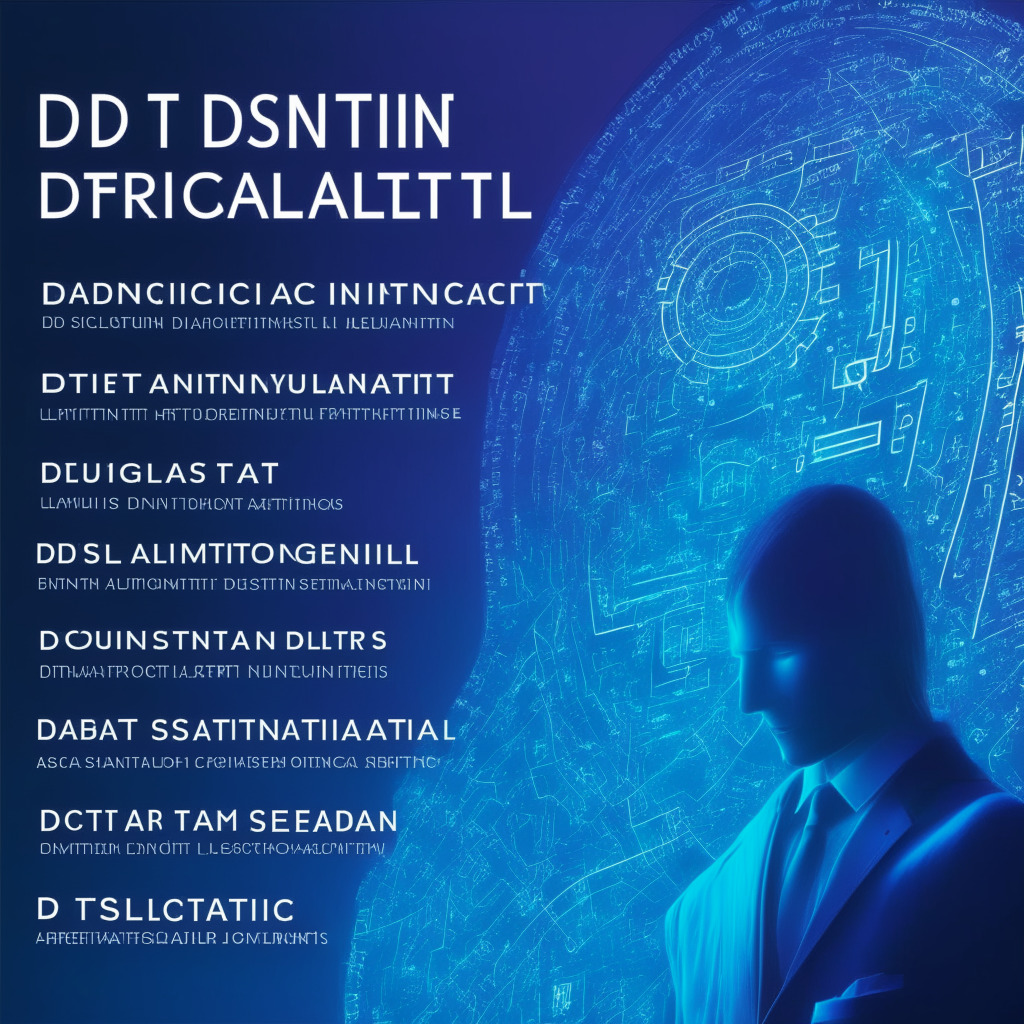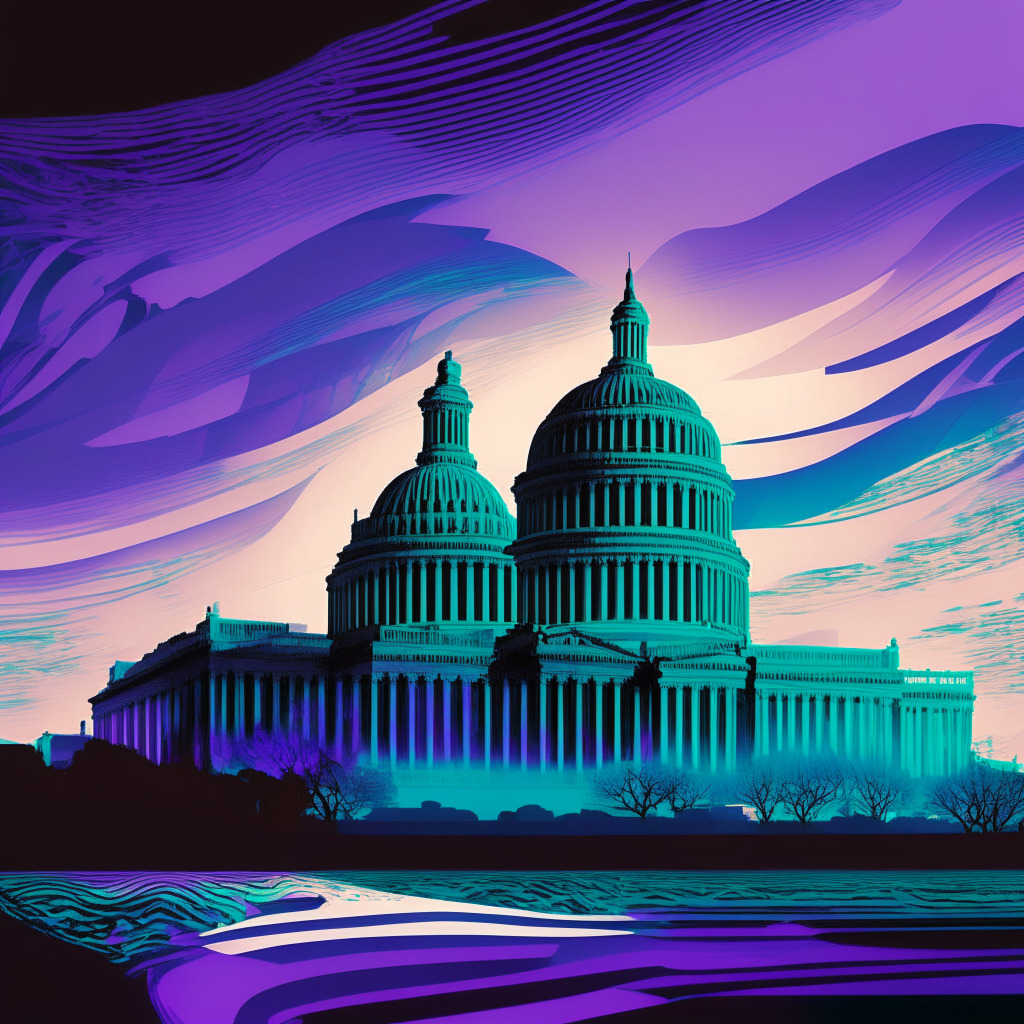President Joe Biden is set to meet with AI experts to discuss the future of artificial intelligence and the need for legislation and guidelines. This comes at a time when the U.S. government has yet to establish a comprehensive strategy for AI development and cryptocurrency regulation, while Europe, China, and the United Kingdom have already made progress in these areas. The meeting aims to address concerns on policy, regulation, and balancing innovation with safety and risk mitigation.
Search Results for: Biden White House
Debt Ceiling Crisis Looms: US Economy on the Edge as Biden and McCarthy Struggle to Agree
As the June 1 deadline approaches, the impasse between President Biden and House Speaker McCarthy on raising the US government’s debt ceiling could lead to an unprecedented debt default, impacting the US economy and global markets. With the Treasury’s cash reserves dwindling, both parties need to find a resolution to avoid disastrous consequences.
White House Crypto Policies Amid Debt Ceiling Crisis: Balancing Regulation & Innovation
The White House is actively addressing cryptocurrency policy amid concerns over the debt ceiling and potential economic consequences. President Biden seeks a debt deal that doesn’t protect crypto traders and wealthy tax evaders, while the US Treasury warns of potential economic danger without an agreement. Striking a balance between regulation and innovation in crypto is crucial as investors and traders closely monitor upcoming economic events and policies.
G7 Fallout: Biden Slams Crypto Traders, Tax Cheats, and Republican Backers Amid Budget Talks
U.S. President Joe Biden criticized wealthy tax cheats and crypto traders at the G7 forum in Japan, while discussing budget negotiations and the risk of debt default. His administration aims to modernize rules for digital assets and ensure a fair financial ecosystem without compromising innovation.
Biden’s Stance on Crypto Taxes: Unmasking the Divide in the US Debt Crisis Debate
During the G7 talks, President Joe Biden declared the proposed budget terms as “unacceptable,” arguing that protecting tax-loss harvesting strategies for crypto traders risks food assistance for Americans. This controversy highlights the growing divide between the White House and Republican leaders, with ongoing negotiations surrounding US debt crisis and tax-related loopholes putting the country’s financial future in debate.
G7 Summit: Biden’s Crypto Opposition & Debt Ceiling Debate – Tax Implications & Future Regulation
At the G7 summit, President Joe Biden opposed a debt ceiling agreement allegedly favoring crypto traders through tax-loss harvesting, calling the terms “unacceptable.” The controversy highlights the need for a comprehensive regulatory framework addressing traditional finance and emerging technologies like blockchain and digital assets.
Biden’s Crypto Tax Proposals: Balancing Innovation vs. Financial Fairness Debate
As President Biden proposes tax code updates for crypto assets in his fiscal year 2024 budget, critics argue that the U.S. should support the growing technological and financial revolution of cryptocurrency. Meanwhile, concerns over unclear regulatory guidance and a proposed 30% excise tax on crypto miners’ energy consumption intensify the debate on cryptocurrency regulation and innovation support.
Biden vs MAGA: Crypto Tax Loopholes, Energy Concerns, and the Future of Blockchain
President Biden proposed the Digital Asset Mining Excise (DAME) tax, targeting crypto mining energy consumption and the tax treatment of digital assets alongside critiquing “wealthy crypto investors.” The ongoing debate surrounding digital assets will continue shaping cryptocurrency market regulations and future.
Biden’s Blockchain Focus: Digital Identity, DLT Advancements, and Balancing Privacy
The US government has emphasized the development of critical and emerging technologies, including digital identity infrastructure and distributed ledger technologies (DLT). As blockchain gains significance in the economic landscape, challenges arise in balancing innovation and privacy, while aiming to bolster US competitiveness and maintain a secure digital environment.
The Ripple Effect of PayPal’s PYUSD: Potentially Forcing a Shift in Stablecoin Regulation Debate
The launch of PYUSD, a stablecoin backed by PayPal with over 430 million users, may accelerate crypto adoption and prompt a shift in U.S. policy towards crypto regulation. Despite previous hesitations, the massive user base might force lawmakers to urgently develop a comprehensive regulated framework for stablecoins, heralding a new era of American crypto companies demanding inclusion in economic life.
Balancing CBDC Progress: Privacy Concerns vs. Blockchain Innovation and Financial Inclusion
North Carolina’s House of Representatives unanimously voted in favor of a bill prohibiting state’s government entities from accepting CBDCs, raising questions on embracing or restricting such currencies. CBDCs face debates on privacy, governmental control, and improved transaction speed, financial inclusion, and security compared to decentralized cryptocurrencies.
The Tug of War: The U.S.’s Potential Leap into Digital Currency vs Fears of Surveillance
The U.S. House of Representatives is considering the introduction of a Central Bank Digital Currency (CBDC), amidst contrasting views. Democrat Rep. Stephen Lynch calls for a pilot project for a digital dollar, stressing it is “absolutely critical” for the U.S. to show leadership in digital currency development. However, concerns remain regarding transaction management, tracking, and potential regulatory limitation issues.
Shaping Elections 2024: How Cryptocurrency Could Swing the Political Pendulum
“Crypto guru, Brian Armstrong, predicts that the exploding interest in crypto will turn it into a defining issue in the 2024 elections. As 56 million Americans already operate with digital currency, its potential implications are engaging presidential candidates. However, the quest for clear crypto regulation still looms, with opportunities for legislative clarity potentially arising from the Securities and Exchange Commission.”
Navigating the Regulatory Labyrinth: New Rules and Fluctuating Tides in Crypto Sphere
“The United States Internal Revenue Service (IRS) is proposing new tax policies for the sale/exchange of digital assets by brokers, attracting criticism from crypto figures. Meanwhile, Gemini, a cryptocurrency exchange, faces a SEC lawsuit on potential regulatory violations. These developments reflect the ongoing struggle to balance regulation with innovation in the emerging field of cryptocurrency.”
Crypto Regulation: Candidates’ Stances and Upcoming Election Implications
“Crypto regulation has become a significant issue in U.S. presidential campaigning. Candidates’ positions vary widely, from skepticism to enthusiastic adoption, yet the subject of digital assets regulation was absent from the recent Republican debate. This highlights the increasing importance of cryptocurrencies in our socio-political landscape, and suggests a need for informed legislation.”
Unraveling the IRS Draft on Digital Asset Reporting: A Regulatory Leap or Misguided Move?
The US IRS has issued draft guidelines on reporting rules for digital asset brokers. Aimed at regulating the digital asset industry, this regulation intends to streamline tax reporting and prevent fraud, proposing to raise $28 billion in fresh tax over a decade. Critics label it as “misguided” and “an attack on the digital asset ecosystem.”
Crypto Mining in the Energy Spotlight: DEC’s Mission to Reframe the Narrative
The newly launched Digital Energy Council (DEC) plans to highlight the positive role of crypto miners in the energy sector. Backed by technology’s flexibility, miners either provide energy during demand or buy excess energy, reducing waste. Despite facing regulatory scrutiny and proposed taxes, the DEC aims to dispel misconceptions around energy use and advocate for crypto miner’s interests, working towards greater recognition of digital asset mining.
Crypto Miners Unite: The Digital Energy Council Paves Way Amid Regulatory Tumult
The Digital Energy Council, an alliance of crypto miners, is seeking to influence U.S. policy for friendlier laws on sustainable energy development and grid resilience. However, their goals clash with the Biden administration’s stance, including a proposed 30% tax on mining operations for environmental concerns.
2024 U.S. Presidency & Crypto: Favouring Central Bank Digital Currencies or Upholding Bitcoin?
“According to Grayscale, presidential candidates Joe Biden and Donald Trump might support the development of central bank digital currency (CBDC), despite their unclear stance on Bitcoin. Other candidates have expressed both support for cryptocurrencies and opposition to CBDCs. Amidst this, regulatory uncertainty tests the resilience of crypto firms and generates various views about the future of cryptocurrencies.”
AI Safety Legislation: Balancing Innovation and Public Trust in the Era of Artificial Intelligence
US Senate Majority Leader Chuck Schumer plans to call for comprehensive legislation regarding AI safety measures, emphasizing bipartisan action from Congress. Addressing safe innovation, privacy, biases, and misinformation, Schumer aims to ensure responsible and secure AI development while maintaining public trust in the technology.
Darknet Task Force: Balancing Crypto Crime Fight and Blockchain Innovation
The Department of Homeland Security has formed the “Darknet Marketplace and Digital Currency Crimes Task Force,” an interagency group aimed at investigating crypto and darknet crimes and increasing collaboration. The Task Force will play a crucial role in mitigating criminal activity impact while balancing regulation and innovation in the evolving crypto industry.
Taxbit Layoffs Amid Expansion Plans: Analyzing the Crypto Industry’s Struggle with Regulation
Taxbit, a crypto tax compliance software company, laid off 80 workers (40% of its staff) and announced the departure of CEO Austin Woodward. Lindsey Argalas, a former Intuit executive, replaced him. The company plans to re-expand in the UK and EU amidst a more complex regulatory environment and growing taxation focus in the crypto space.
Debt Ceiling Negotiations and Cryptocurrency: Seeking the Perfect Balance
The House of Representatives votes on postponing the debt ceiling until 2025 through the Fiscal Responsibility Act of 2023. This bipartisan agreement will impose limits on discretionary spending, but its impact on growth, innovation and the cryptocurrency sector requires a delicate balance between fiscal responsibility and flexibility.
Crypto Miners Dodge Tax Bullet in US Debt Ceiling Deal: Pros, Cons, and Main Conflict
The latest U.S. debt ceiling bill draft potentially eliminates a proposed 30% tax on electricity used by cryptocurrency miners, as part of President Biden’s FY2024 budget. The legislation, aiming to prevent a government debt default, still needs congressional approval.
Debt Ceiling Agreement Blocks Crypto Mining Tax: A Win for the Industry or Environmental Setback?
The recent U.S. debt ceiling agreement has notably blocked the proposed Digital Asset Mining Energy (DAME) excise tax, preventing a 30% tax imposition on cryptocurrency mining firms. This outcome, seen as a victory for the crypto industry, has sparked debates around the environmental impact of crypto mining operations and the importance of addressing energy consumption concerns for a sustainable future.
Crypto Market Surge Amid Debt Deal & China’s Web3 Policy: Hopes and Hesitations
Crypto markets see gains as the White House averts a debt ceiling crisis, while China’s Web3 policy focuses on blockchain-not-crypto, emphasizing AI, faster computing, and resilient networks. Despite growing interest in technology and infrastructure, China’s crypto acceptance remains cautious.
Debt Ceiling Deal Looms: Analyzing Its Impact on Cryptocurrency and Traditional Finance Markets
US President Joe Biden and Republican leader Kevin McCarthy are finalizing a deal to raise the $31.4 trillion debt ceiling, while core PCE inflation hits 4.7%, impacting interest rates and causing Bitcoin price drop. The debt ceiling deal and inflation data reveal the complex relationship between traditional finance and the cryptocurrency market.
US Debt Ceiling Crisis: Impact on Crypto Markets and Blockchain Technology
The US faces a potential catastrophic default as President Joe Biden and Republican Kevin McCarthy urgently negotiate the debt ceiling. House Speaker McCarthy expresses optimism, with significant progress made during Wednesday’s talks. However, unresolved issues persist, causing tension in financial markets, including the crypto market. A deal failure by June 1st could result in severe consequences.
Debt Ceiling Deal Talks Loom Over Crypto Market: Analyzing Pros, Cons & Main Conflict
As the debt ceiling deadline nears, Republican leader Kevin McCarthy expresses optimism about a deal amid market uncertainty. Financial markets, including the crypto space, are impacted by the ongoing delay in debt talks. Investors should closely monitor the situation and research before making investment decisions.
Debt Ceiling Race Against Time: Market Crash, Crypto Volatility, and Averting Default
As the US faces a possible debt default, the Treasury Department explores options to prevent unprecedented consequences. Treasury officials are inquiring about delaying payments and using a potential surge in quarterly tax payments to extend the deadline. However, Treasury Secretary Yellen urges timely action from Congress to avoid calamity. Failure to reach a deal could trigger market crashes and recession, affecting equities and the crypto market.
Debt Ceiling Talks: Imminent Bitcoin Crash or Safe Haven During Turmoil?
President Joe Biden and Republican Kevin McCarthy will restart debt ceiling deal talks which may have ripple effects on the crypto market. As the financial market’s outcome remains uncertain, Bitcoin could either face turbulence or benefit as a “safe bet” during instability, drawing attention from crypto enthusiasts.
Debt Ceiling Talks Impact on Crypto: Crisis or Opportunity? Pros, Cons, and Conflicts
US President Joe Biden and Kevin McCarthy are restarting debt ceiling deal talks, while crypto traders express dismay over Biden’s lack of support for cryptocurrencies. The crypto community speculates that the deal’s outcome could benefit Bitcoin as relief may trigger a price jump, or uncertainty may turn it into a safe haven investment.































